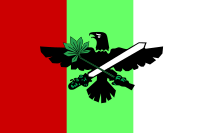National Council for the Defense of Democracy – Forces for the Defense of Democracy
The National Council for the Defense of Democracy – Forces for the Defense of Democracy (French: Conseil National Pour la Défense de la Démocratie – Forces pour la Défense de la Démocratie, or CNDD–FDD) is the major political party in Burundi. During the Burundian Civil War, the CNDD–FDD was the most significant rebel group active and became a major political party in Burundi. In March 2012, Pascal Nyabenda was elected as President of CNDD–FDD. Then on 20 August 2016, General Évariste Ndayishimiye was, in the extraordinary congress that took place in Gitega, elected as the Secretary General of the Party.
National Council for the Defense of Democracy–Forces for the Defense of Democracy Conseil National Pour la Défense de la Démocratie–Forces pour la Défense de la Démocratie | |
|---|---|
 | |
| President of Burundi | General Évariste Ndayishimiye |
| Party President | Pascal Nyabenda |
| Permanent Visionary | Pierre Nkurunziza |
| Founded | 1994 |
| Registered | January 2005 |
| Headquarters | Bujumbura, Burundi |
| Youth wing | Imbonerakure |
| Ideology | Hutu nationalism |
| Colors | Red, Green, White |
| Senate | 33 / 43 |
| National Assembly | 86 / 123 |
| Party flag | |
 | |
| Website | |
| http://cndd-fdd.org/ | |
| History of Burundi |
|---|
|
|
Burundi 1962–present
|
|
Current
|
During the civil war, CNDD was the political wing of the organization, while the FDD was the military wing. It was founded in 1994, a year after the assassination of the first democratically elected President Melchior Ndadaye. The political wing was dominated by Hutu intellectuals from the southern region of Bururi led by Leonard Nyangoma, while the fighting wing was composed of troops drawn from throughout the country, which led to a split in the group in 2001.
The rebel group was often referred to simply as Forces for the Defense of Democracy (FDD).
In 2001, the CNDD– FDD consisted of about 25,000 rebels led by Jean-Bosco Ndayikengurukiye. However a schism in October 2001 led to the overthrow of Ndayikengurukiye by Pierre Nkurunziza. The Nkurunziza-led faction, consisting of 20,000 to 22,000 troops signed a ceasefire with the government in December 2002 but continued fighting. The faction led by Ndayikengurukiye became the lesser of the two with about 5,000 fighters. It also signed a ceasefire with the government in October 2002 to which it has roughly held.
At an official ceremony on January 2005, the group registered as a legal political party. In largely peaceful parliamentary elections on 4 July 2005, the CNDD won an estimated 60 to 80 percent of the vote, making it likely that a CNDD representative would be chosen the president in August. Pierre Nkurunziza indeed was elected President of Burundi unopposed on August 19. At the legislative elections, the party won 57.8% and 64 out of 118 seats.
CNDD–FDD's youth wing is led by Hon Sylvestre Ndayizeye.
Electoral history
Presidential elections
| Election | Party candidate | Votes | % | Result |
|---|---|---|---|---|
| President elected by National Assembly and Senate | ||||
| 2005 | Pierre Nkurunziza | 151 | 94.4% | Elected |
| President elected by popular vote | ||||
| 2010 | Pierre Nkurunziza | 2,479,483 | 91.62% | Elected |
| 2015 | 1,961,510 | 69.41% | Elected | |
| 2020 | Évariste Ndayishimiye | 3,082,210 | 71.45% | Elected |
National Assembly elections
| Election | Party leader | Votes | % | Seats | +/– | Position |
|---|---|---|---|---|---|---|
| 2005 | Hussein Radjabu | 1,417,800 | 58.55% | 64 / 118 |
||
| 2010 | Jérémie Ngendakumana | 1,848,023 | 81.19% | 81 / 106 |
||
| 2015 | Pascal Nyabenda | 1,721,629 | 60.28% | 77 / 121 |
||
| 2020 | 3,036,286 | 70.98% | 86 / 123 |
Senate elections
| Election | Party leader | Seats | +/– | Position |
|---|---|---|---|---|
| 2005 | Hussein Radjabu | 32 / 49 |
||
| 2010 | Jérémie Ngendakumana | 32 / 41 |
||
| 2015 | Pascal Nyabenda | 33 / 43 |
Further reading
- Nindorera, Willy (2012). The CNDD–FDD in Burundi: The Path from Armed to Political Struggle. Berlin: Berghof-Stiftung für Konfliktforschung. ISBN 978-3-941514-06-5. OCLC 873376633.
External links
- Ex-Hutu rebels win Burundi poll, BBC 5 July 2005
